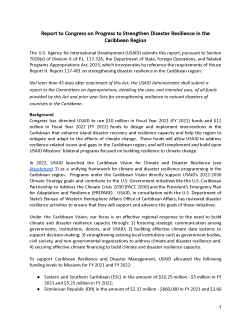The U.S. Agency for International Development (USAID) submits this report, pursuant to Section 7019(e) of Division K of P.L. 117-328, the Department of State, Foreign Operations, and Related Programs Appropriations Act, 2023, which incorporates by reference the requirements of House Report H. Report 117-401 on strengthening disaster resilience in the Caribbean region:
Not later than 45 days after enactment of this Act, the USAID Administrator shall submit a report to the Committees on Appropriations, detailing the uses, and intended uses, of all funds provided by this Act and prior year Acts for strengthening resilience to natural disasters of countries in the Caribbean.
Background
Congress has directed USAID to use $10 million in Fiscal Year 2021 (FY 2021) funds and $12 million in Fiscal Year 2022 (FY 2022) funds to design and implement interventions in the Caribbean that enhance island disaster recovery and resilience capacity and help the region to mitigate and adapt to the effects of climate change. These funds will allow USAID to address resilience-related issues and gaps in the Caribbean region, and will complement and build upon USAID Missions’ bilateral programs focused on building resilience to climate change.
In 2022, USAID launched the Caribbean Vision for Climate and Disaster Resilience (see Attachment 1) as a unifying framework for climate and disaster resilience programming in the Caribbean region. Programs under the Caribbean Vision directly support USAID’s 2022-2030 Climate Strategy goals and contribute to the U.S. Government initiatives like the U.S.-Caribbean Partnership to Address the Climate Crisis 2030 (PACC 2030) and the President’s Emergency Plan for Adaptation and Resilience (PREPARE). USAID, in consultation with the U.S. Department of State’s Bureau of Western Hemisphere Affairs Office of Caribbean Affairs, has reviewed disaster resilience activities to ensure that they will support and advance the goals of these initiatives.
Under the Caribbean Vision, our focus is on effective regional response to the need to build climate and disaster resilience capacity through: 1) fostering strategic communication among governments, institutions, donors, and USAID; 2) building effective climate data systems to support decision-making; 3) strengthening existing local institutions such as government bodies, civil society, and non-governmental organizations to address climate and disaster resilience and, 4) securing effective climate financing to build climate and disaster resilience capacity.

